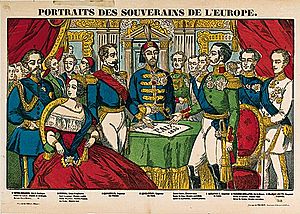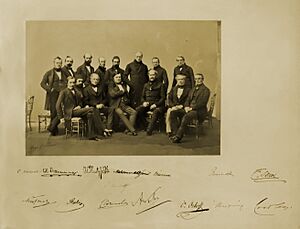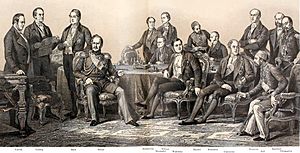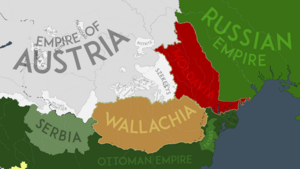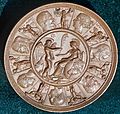Treaty of Paris (1856) facts for kids
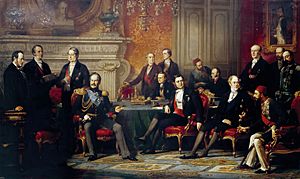
Edouard Louis Dubufe, Congrès de Paris, 1856, Palace of Versailles.
|
|
| Type | Multilateral Treaty |
|---|---|
| Signed | 30 March 1856 |
| Location | Paris, France |
| Original signatories |
|
| Ratifiers | France, United Kingdom, Ottoman Empire, Sardinia, Prussia, Austria, Russian Empire |
| Language | French |
The Treaty of Paris of 1856 was a very important agreement. It officially ended the Crimean War. This war was fought between the Russian Empire and a group of countries. These countries were the Ottoman Empire, the United Kingdom, the Second French Empire, and the Kingdom of Sardinia.
The treaty was signed in Paris on March 30, 1856. It made the Black Sea a neutral area. This meant no warships were allowed there. Also, no forts or weapons could be built on its shores. This greatly reduced Russia's power in that region. Russia had to give back Sevastopol and other towns in Crimea. They could not build any naval bases on the Black Sea coast.
Contents
Ending the Crimean War
The Treaty of Paris was signed on March 30, 1856. It happened at a big meeting called the Congress of Paris. Russia was on one side of the talks. France, Britain, the Ottoman Empire, and the Kingdom of Sardinia were on the other. The treaty was needed to stop the Crimean War. This war had started on October 23, 1853. It began when the Ottoman Empire declared war on Russia. This was after Russian troops moved into the Danubian Principalities.
The treaty was a big success for the Ottoman Empire's reform plans, known as Tanzimat. The European allies promised to keep the Ottoman Empire strong. They also gave back all lands to Russia and the Ottomans that were taken during the war. They made the Black Sea a neutral zone. This helped trade but made Russia much weaker in that area. Moldavia and Wallachia became almost independent states. They were still under Ottoman rule, but gained land from Russia near the Danube River.
Peace Talks and Challenges
After the Crimean War, everyone wanted a lasting peace. The war had caused many deaths and much damage. But it was hard to agree on a peace treaty. Even the allies had different ideas about what the treaty should include. This made it difficult to create a strong peace. There was also a lot of distrust between France and Britain. This made it even harder to write a full peace agreement. So, the treaty's rules made future relations between the big powers uncertain.
What Each Side Wanted
Russia's Goals
Even though Russia lost the war, they wanted the best deal possible. Alexander II became Russia's leader in 1855. He faced a huge crisis that could break apart his empire. There were problems everywhere, from Finland to Poland and Crimea. The Russian economy was also in trouble. Russia knew that a total defeat was coming soon. This would be a huge embarrassment for Russia around the world.
Alexander II wanted peace talks with Britain and France in Paris. He hoped to keep some of Russia's lands. He also wanted to stop the deaths of thousands of soldiers. And he wanted to prevent a total economic collapse. Russia also wanted to seem strong, even after losing. They tried to "turn defeat into victory" through changes at home and smart diplomacy.
Britain and France's Goals
During the war, Britain and France had their own old rivalry. This came from the Napoleonic Wars. The French thought Britain had started the war without a clear plan. British mistakes, like the Charge of the Light Brigade, showed their problems. This made people want a more professional army. Britain worried that France might use a weak Russia to get revenge for past defeats.
Some people in Britain wanted the war to end. There were even riots in London. But others, like Prime Minister Lord Palmerston, wanted to keep fighting. They wanted to punish Russia's big ambitions.
Britain and France wanted to make the Ottoman Empire stronger. This would help keep a good balance of power in Europe. They hoped that peace would let the Ottomans fix their own problems. These problems included growing nationalism in their lands. If the Ottomans lost control, other big powers like Russia or Austria might take their land. This would make Russia and Austria stronger, which Britain and France did not want. So, removing Russia from the Danubian areas and the Black Sea helped Britain stay powerful. It also stopped Russia from growing too much.
What Russia Lost
The Ottoman, British, and French governments wanted to defeat Russia even more. Russia had lost over 500,000 soldiers. They knew fighting more would mean even more losses for their army.
Russia had to leave the Danubian Principalities. These areas then came under the shared care of the Ottomans and the big European powers.
Russia also had to give back part of Moldavia that it had taken in 1812. This land was near the mouth of the Danube River. The Danubian Principalities and Principality of Serbia gained more self-rule. This meant Russia had less power over them.
Russia also had to give up its claim to protect Christians in the Ottoman Empire. This claim had been one of the reasons for the Crimean War.
Russian warships were banned from the Black Sea. This greatly reduced Russia's power over trade there.
The defeat showed how weak the Russian Empire was. It led to big changes later, like freeing the serfs. It also helped spread new ideas about revolution.
Immediate Effects
The treaty made the Black Sea safe for international trade again. Before, trade was hard because of the war and Russian warships.
The public in France and Britain also influenced the Treaty of Paris. The Crimean War was one of the first wars where people got news quickly. The British prime minister, Lord Aberdeen, was seen as not good at leading the war. He lost a vote and resigned. Lord Palmerston took over. He had a clearer plan for victory. Peace happened faster partly because people knew more about politics. They demanded an end to the war.
Long-Term Effects
The Crimean War made nationalism stronger in many places. The Ottoman Empire faced many uprisings in its provinces for decades after the war. It was slowly breaking apart. Many ethnic groups wanted more rights, especially to rule themselves. Britain and France might have made Europe stable for a short time. But the Treaty of Paris did not create lasting peace. The Ottomans joined the group of European powers after the treaty. But most European nations looked at the weakening empire with either greed or worry.
The war showed how important solving the "Eastern Question" was for Europe's stability. This question was about the future of the Ottoman Empire. But the Treaty of Paris did not give a clear answer.
The Ottoman Empire was very important to Britain and France. It helped keep the balance of power in the Black and Mediterranean Seas. So, signing the Treaty of Paris meant the Ottoman Empire joined European politics. European influence grew in Ottoman law. This led to the Ottoman Empire playing a big role in the First World War.
Austria and Germany were also affected by nationalism because of the treaty. Austria was usually Russia's friend. But it stayed neutral during the war. It even threatened Russia to leave the Balkans.
After Russia lost, relations between Russia and Austria became very bad. Russia had helped Austria during the Hungarian Revolution of 1848. But Austria did not help Russia in the Crimean War. Because of this, Russia did not help Austria in later wars. This led to Austria losing power in Italy and over the German Confederation. Austria's power as a major country became much smaller. It slowly became like a small state controlled by Germany.
A strong, united Germany was not a good idea for Britain and France. It would threaten French borders and British interests in the East.
So, the war that aimed to make Europe stable only brought a temporary peace. The big powers made nationalist feelings stronger in many groups. By 1877, Russia and the Ottomans were at war again.
Key Rules of the Treaty
The treaty allowed the Ottoman Empire to join the group of European powers. These powers promised to respect its independence and land. Russia gave up some land. It also gave up its claim to protect Christians in Ottoman lands. The Black Sea was made a neutral zone, meaning no military ships. A group was set up to make sure trade and travel on the Danube River were free for everyone.
Moldavia and Wallachia stayed under Ottoman rule, but they got their own governments. These were watched by the winning powers. People in these areas voted on whether to unite. They eventually did in 1859. Moldavia got back part of Bessarabia that it had before 1812. This created a buffer zone between the Ottoman Empire and Russia. The United Principalities of Romania, formed from these two areas, stayed under Ottoman rule until 1877.
New rules for trade during wartime were also made. These were called the Declaration of Paris:
- Privateering (private ships attacking enemy ships) was made illegal.
- A neutral flag protected enemy goods, except for illegal items.
- Neutral goods were safe, even if on an enemy ship.
- A blockade (blocking ports) had to be effective to be legal.
The treaty also made the Åland Islands in the Baltic Sea a neutral zone. These islands belonged to Russia's Grand Duchy of Finland. A fort there had been destroyed by British and French forces in 1854. The allies wanted to stop Russia from using it as a military base in the future.
Who Signed the Treaty
 France
France
- Alexandre, Count Colonna-Walewski, Foreign Minister
- François-Adolphe, Baron de Bourqueney, ambassador to Vienna
 Austria
Austria
- Count Karl Ferdinand von Buol, Foreign Minister
- Baron Joseph Alexander von Hübner, ambassador to Paris
 United Kingdom
United Kingdom
- George Villiers, 4th Earl of Clarendon, Foreign Secretary
- Henry Wellesley, 2nd Baron Cowley, ambassador to Paris
 Prussia
Prussia
- Otto Theodor von Manteuffel, Minister President of Prussia
- Count Maximilian von Hatzfeldt-Trachenberg, ambassador to Paris
 Russia
Russia
- Alexey Fyodorovich, Count Orloff, Representative
- Count Philipp von Brunnow, ambassador to German Confederation
 Sardinia
Sardinia
- Camillo Benso, Count of Cavour, Prime Minister
- Salvatore Pes, Marquis of Villamarina, ambassador to Paris
 Ottoman Empire
Ottoman Empire
- Mehmed Emin Âli Pasha, Grand Vizier
- Mehmed Cemil Bey, ambassador to Paris
Legacy of the Treaty
- In 2006, Finland celebrated 150 years since the Åland Islands became neutral. They made a special coin for it. One side shows a pine tree, common in Åland. The other side shows a boat's back with a dove, a symbol of peace.
Images for kids
 | Delilah Pierce |
 | Gordon Parks |
 | Augusta Savage |
 | Charles Ethan Porter |


